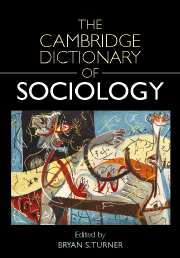U
Published online by Cambridge University Press: 22 October 2021
Summary
underclass
– see social class.
underdevelopment
– see development theory.
understanding
– see Verstehen.
unemployment
A major topic of social research during periods of mass unemployment in the twentieth century, unemployment arose with the growth of dependency on waged employment. It involves exclusion from paid employment but definitions and measurement remain contentious. The International Labour Organization definition, widely adopted for comparative studies of countries and over time, includes people currently available for work who actively looked for work during the previous month. This excludes the discouraged unemployed, those not currently seeking work but who might take a job if offered. However, it includes some excluded from official counts because of ineligibility for state benefits, as eligibility is usually more restricted (and shifts with policy changes).
Sociologists often focus on the experience and consequences of unemployment, leaving economists to analyze causes. Economists distinguish between frictional unemployment, involving individual mobility of workers between jobs; structural unemployment, resulting from the decline of particular sectors or occupations; and cyclical unemployment, resulting from general but temporary falls in economic activity. However, consideration of the underlying processes that generate these patterns of unemployment exposes continuing controversy among economists, for example between neoliberal, neo-Keynesian, and neo-Marxist analyses of the political economy of contemporary capitalism. Thus, economic sociologists have to adjudicate between these different causal accounts, which involve implicit or explicit claims about the institutional arrangements and social class relations that help to generate different patterns and levels of unemployment in different societies and phases of capitalist development.
Early sociological accounts of the experiences and responses of the unemployed portrayed a progression from optimistic job search to pessimism, then fatalistic adaptation as unemployment lengthened. More recently the unemployed have been seen as a distinct underclass, with two contrasting versions of this diagnosis. The radical version suggests many unemployed people experience structural exclusion from secure employment, compounded by ethnic or cultural exclusion. This generates distinctive subcultures, alienated from mainstream society, promoting radical political dissent. The conservative variant regards much unemployment as a lifestyle choice of work avoidance, fostered by generous welfare benefits and culturally reproduced across generations.
- Type
- Chapter
- Information
- The Cambridge Dictionary of Sociology , pp. 643 - 647Publisher: Cambridge University PressPrint publication year: 2006



